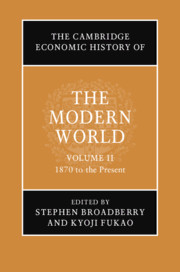Book contents
- The Cambridge Economic History of the Modern World
- The Cambridge Economic Historyof the Modern World
- The Cambridge Economic History of the Modern World
- Copyright page
- Contents
- Figures
- Tables
- Contributors to Volume II
- Introduction to Volume II
- Part I Regional Developments
- Part II Factors Governing Differential Outcomes in the Global Economy
- 12 Healthy, Literate, and Smart
- 13 Proximate Sources of Growth
- 14 Underlying Sources of Growth
- 15 Underlying Sources of Growth
- 16 Living Standards, Inequality, and Human Development
- 17 Trade and Immigration
- 18 International Finance
- 19 War and Empire
- Index
- References
19 - War and Empire
from Part II - Factors Governing Differential Outcomes in the Global Economy
Published online by Cambridge University Press: 03 June 2021
- The Cambridge Economic History of the Modern World
- The Cambridge Economic Historyof the Modern World
- The Cambridge Economic History of the Modern World
- Copyright page
- Contents
- Figures
- Tables
- Contributors to Volume II
- Introduction to Volume II
- Part I Regional Developments
- Part II Factors Governing Differential Outcomes in the Global Economy
- 12 Healthy, Literate, and Smart
- 13 Proximate Sources of Growth
- 14 Underlying Sources of Growth
- 15 Underlying Sources of Growth
- 16 Living Standards, Inequality, and Human Development
- 17 Trade and Immigration
- 18 International Finance
- 19 War and Empire
- Index
- References
Summary
By the beginning of the twentieth century, a combination of military and economic advantages had allowed imperial powers to expand the territory under their jurisdiction to include large parts of Asia, Africa, and the Middle East. This conquest of territory was both driven by and helped to facilitate the movement of people, goods, and capital in the decades leading up to World War I, with varied impacts on the development of both colonized countries and their colonizers. At the same time, imperial expansion also contributed means and motivation for the global conflicts which erupted during the twentieth century. After these conflicts, empires proved to be fragile. Little more than a half-century after they had reached their peak, most European empires had collapsed, and a new hegemonic order had emerged. This chapter examines the origins and legacies of empires, and asks why European countries lost their empires, despite persistent gaps in technological, military, and economic assets. It also examines the similarities and differences of the new order with the old.
- Type
- Chapter
- Information
- The Cambridge Economic History of the Modern World , pp. 526 - 550Publisher: Cambridge University PressPrint publication year: 2021



